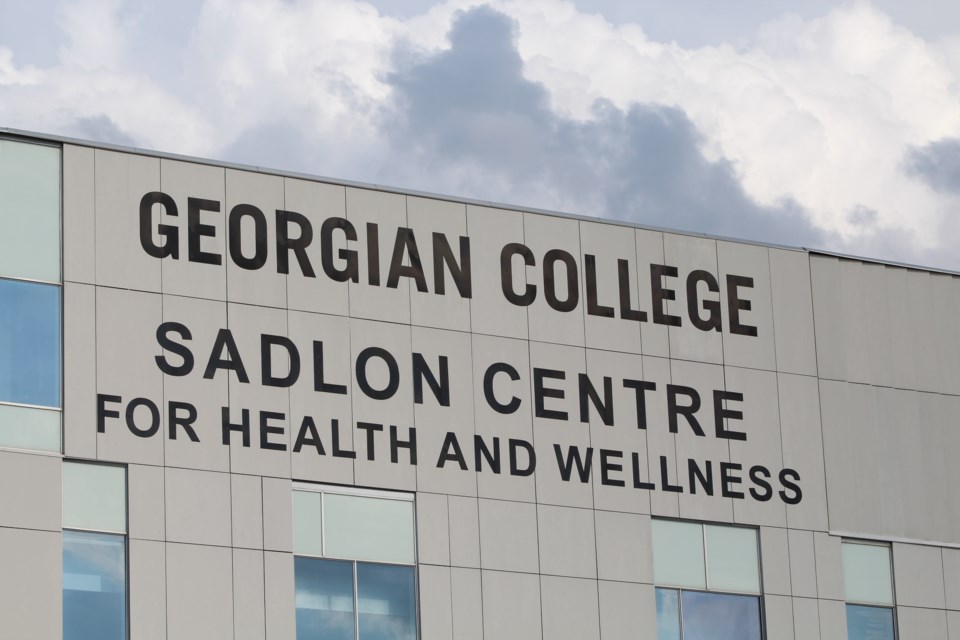Georgian College was set to welcome a record-setting 9,300 students to campus this month, the most in the college’s history, but rising COVID cases have slammed the doors on the return to in-person learning for most students.
“We were on track to have our largest winter intake in the school’s history, and we are still doing remarkably well for a winter semester,” college president and chief executive officer MaryLynn West-Moynes told BarrieToday.
West-Moynes noted feedback from students provided mid-fall indicated their preference was to return to campus for the winter semester and, at the time, that option seemed feasible with the college implementing a vaccination policy for all students, faculty and staff who would be on campus.
“We were well on track for bringing a large majority of our programs back in person," West-Moynes said.
Despite that initial plan, West-Moynes had to make the difficult decision on Dec. 15, 2021 to postpone in-person learning due to the rapidly rising COVID cases the province and the region was seeing, as well as the new omicron variant.
That decision was based on a number of factors, she said, including the early signals the new omicron variant was displaying, as well as conversation between College Committee of Presidents had with the province's chief medical officer of health Dr. Kieran Moore.
“I made the decision we would begin remote for 70 per cent of our activity. The only activity on campus is labs and clinical activity,” she said.
The winter 2022 semester, West-Moynes acknowledged, saw the highest registration for a winter semester at the Barrie college, and while she said doesn’t have any data to support her thoughts as to why so many students were looking at coming to Georgian, she has a few ideas.
“I’ve been in this profession since 1985, so my instincts are telling me (a few things). We did have students hold back because they were unsure about COVID and remote learning. I think that played a factor,” West-Moynes said. “The second major factor is international students. We had a fair bit of unmet demand and that was playing out for our winter semester.”
Despite the move back to online, the influx of college students looking to attend the Simcoe County institution is a positive one, she said, pointing to a report that came out just before Christmas showing more than one million unfilled jobs in Canada.
“We want to make sure we have as many people who are able and want to get post-secondary credentials can get them because we are going to need them to drive our workforce," West-Moynes said.
Now, 22 months into the pandemic, she said the decision to move online may have been a tough one for students to swallow, but faculty are now well-versed in how to best deliver programs remotely.
“We have the tools in place to assist us. We understand that it’s got to be the personal health and well-being of staff and students first and foremost. We want to contribute to a healthy society,” West-Moynes said. “I have a lot of empathy for students, some who have yet to be on campus for a class and they’re on track to graduate at the end of the winter semester. I am certainly disappointed for students who were looking forward to being back on campus.”
The ability to persevere through this pandemic while still attaining their goal of a post-secondary education, she added, displays a level of resilience that she believes will prove them to be great employees one day.
“Like the rest of the world, it is what it is. I think that’s the only way to look at this. There’s no point in being angry. … We are dealing with something that’s beyond our scope of control, and that’s a virus," West-Moynes said. "This is a good lesson for our students who are going to go on and probably be the leaders of our country to understand that sometimes you just have to do what you have to do.”
West-Moynes said when the decision was made in December, college officials informed students that a decision as to what the rest of the semester would look like would likely be made by the end of the second week of January.
“We have an opportunity, because we have a winter break in the middle of the semester… we will be watching the numbers and what’s going on in the hospitals, which seems to be the most relevant data," she said. "I think we all will be looking at what’s going on in our hospitals as a means to assess whether or not we are turning the curve.
“We have proven that if we have to deliver it remotely, we can do it with quality, and those who have been on campus, were able to do it in a very safe mechanism that allowed our students to learn in an environment that they were comfortable with.”



